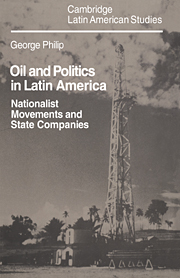Book contents
- Frontmatter
- Contents
- List of tables
- Preface
- Glossary
- Abbreviations
- Note on currencies and other units of measurement
- Maps: Latin America in 1920, 1940, 1960 and 1981; showing importing countries, exporting countries and countries self-sufficient in oil
- Introduction: The politics of oil in twentieth-century Latin America
- Part I The world oil environment
- Part II The major expropriations
- Part III The state oil companies
- 17 Pemex in Mexican politics 1938–79
- 18 The development of Petrobrás: oil company to conglomerate?
- 19 ypf 1932–1979: public enterprise or bureaucracy?
- 20 Petroperú 1968–80: achievements and hard lessons
- 21 ypfb and the development of oil in Bolivia
- 22 Petrovén: the birth of a giant
- 23 State oil companies in Latin America
- 24 Concluding reflections
- Notes and bibliography
- Index
- CAMBRIDGE LATIN AMERICAN STUDIES
21 - ypfb and the development of oil in Bolivia
Published online by Cambridge University Press: 23 December 2009
- Frontmatter
- Contents
- List of tables
- Preface
- Glossary
- Abbreviations
- Note on currencies and other units of measurement
- Maps: Latin America in 1920, 1940, 1960 and 1981; showing importing countries, exporting countries and countries self-sufficient in oil
- Introduction: The politics of oil in twentieth-century Latin America
- Part I The world oil environment
- Part II The major expropriations
- Part III The state oil companies
- 17 Pemex in Mexican politics 1938–79
- 18 The development of Petrobrás: oil company to conglomerate?
- 19 ypf 1932–1979: public enterprise or bureaucracy?
- 20 Petroperú 1968–80: achievements and hard lessons
- 21 ypfb and the development of oil in Bolivia
- 22 Petrovén: the birth of a giant
- 23 State oil companies in Latin America
- 24 Concluding reflections
- Notes and bibliography
- Index
- CAMBRIDGE LATIN AMERICAN STUDIES
Summary
ypfb came into existence following a decree law issued by General Toro in 1936 and took on real importance with the nationalisation of Standard Oil in the following year. For the next 20 years it achieved slow but steady growth until, by the mid-1950s, it had become an important prop to the Bolivian economy, although its scale of operation was still insignificant by international standards. In the next decade, the company suffered from the consequences of Bolivia's dependence on the USA and from competition with Gulf Oil. In 1969, however, ypfb underwent a major expansion with the nationalisation of Gulf and it thus became a significant earner of foreign exchange for the first time. Its economic importance increased further with the completion of a natural gas export pipeline to Argentina in 1972 and with the world price increases of 1973–4. Continuing financial difficulties, however, and the vagaries of Bolivian geology contributed to an increase in problems for the agency. Serious difficulties became apparent in 1977 and have since become increasingly pressing. It is possible that ypfb is once more heading for crisis.
During the whole period YPFB has had to operate in a political environment that could best be described as difficult. Bolivia could never be described as genuinely politically stable for, even when there was continuity in La Paz, there were frequent upheavals in the provinces and severe constraints on many forms of economic policymaking.
- Type
- Chapter
- Information
- Oil and Politics in Latin AmericaNationalist Movements and State Companies, pp. 451 - 468Publisher: Cambridge University PressPrint publication year: 1982



